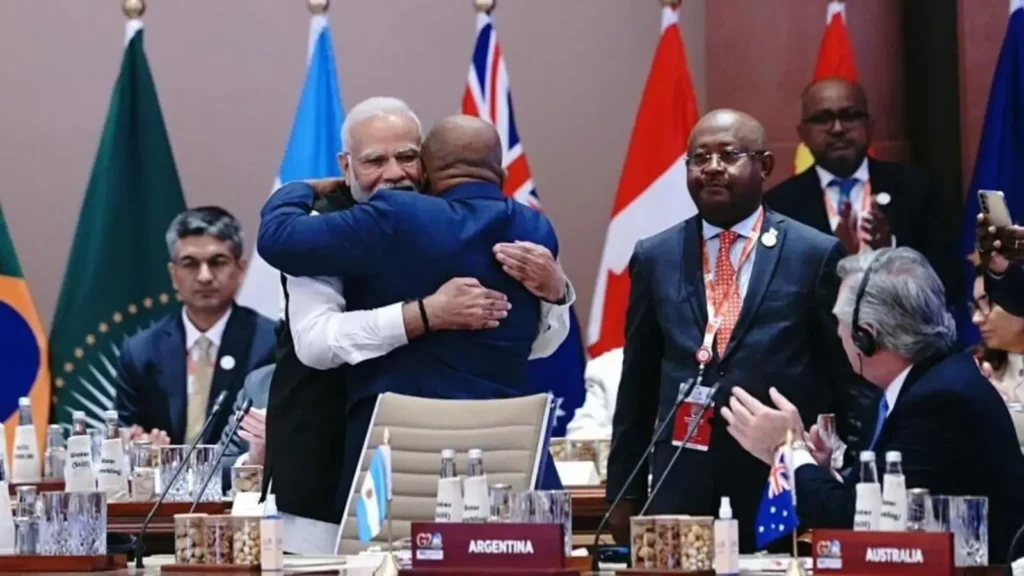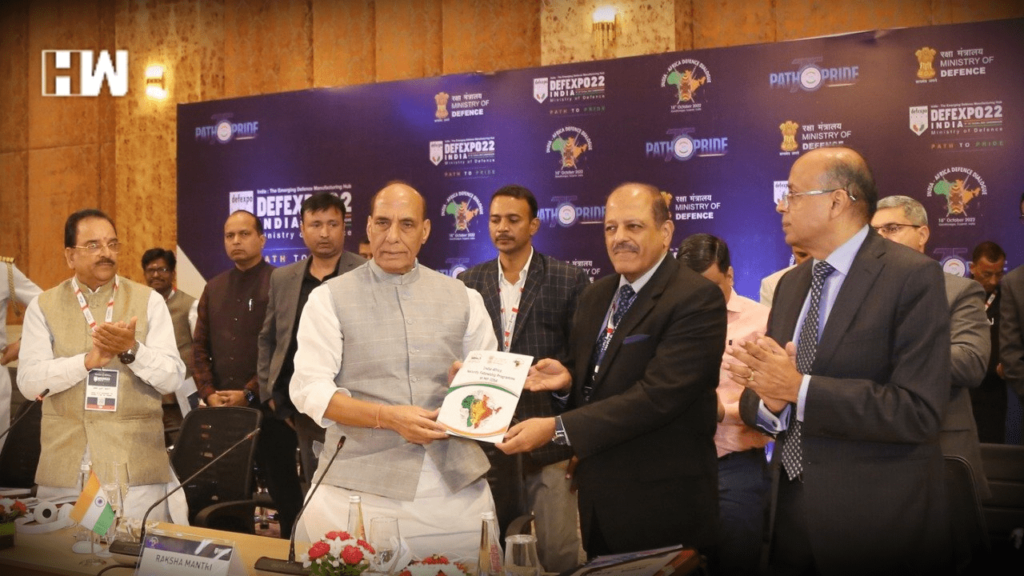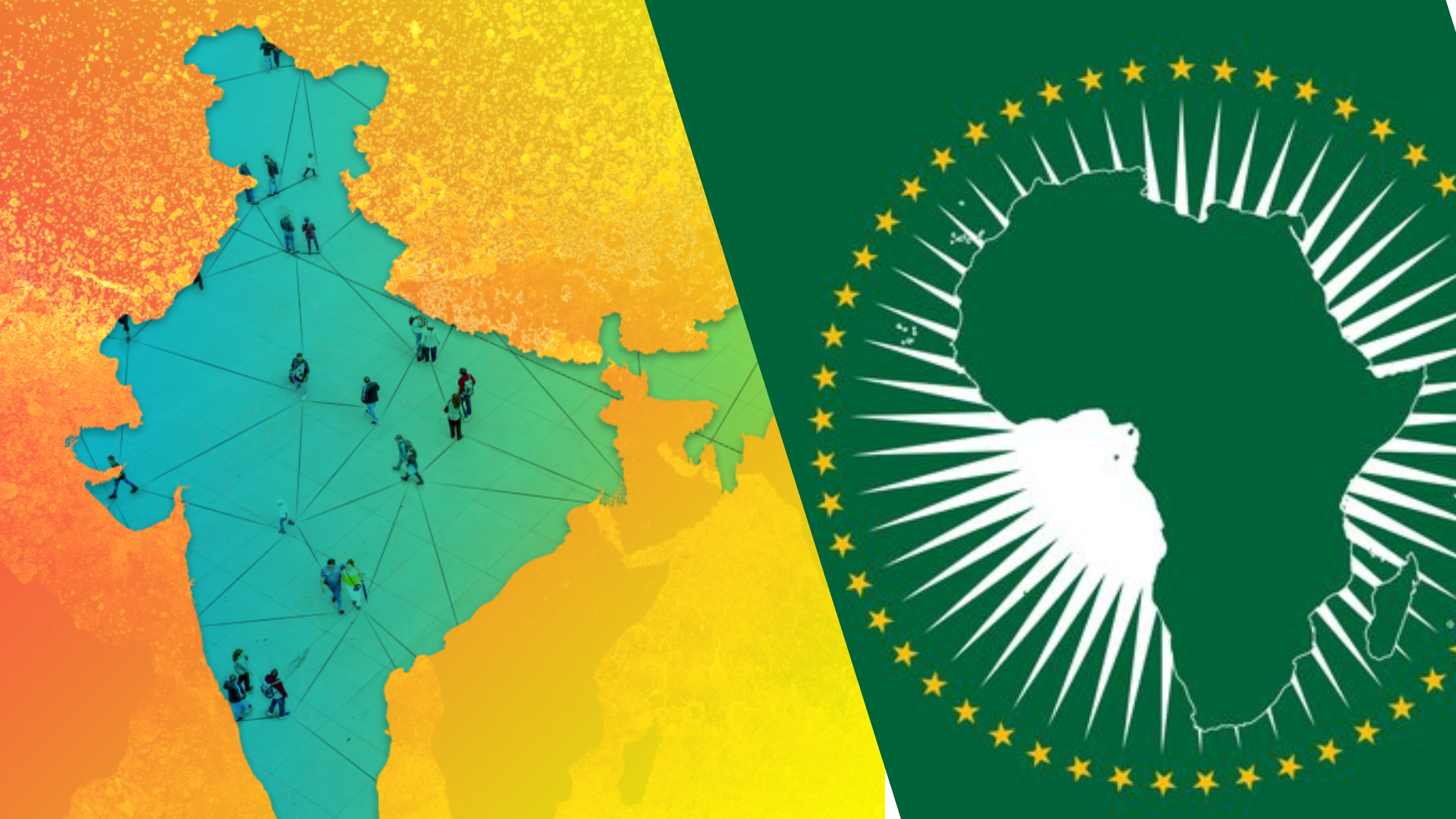“Things fall apart; the centre cannot hold”
– WB Yeats, The Second Coming 1920
“The white man is very clever. He came quietly and peaceably with his religion. We were amused at his foolishness and allowed him to stay. Now he has won our brothers, and our clan can no longer act like one. He has put a knife on the things that held us together and we have fallen apart.”
– Chinua Achebe, Things Fall Apart 1958
Ngũgĩ wa Thiong’o, one of Africa’s leading authors and literary critic writes about language as a tool of domination in his renowned collection of essays, ‘Decolonising the Mind’ (1986). It is this complex sentiment of the colonised experience that emerges as the most prominent value which is shared by India and Africa in modern day. Wa Thiong’o’s essential idea, very much like that of Gandhi, is preoccupied with resistance against the colonisation of mind above everything else. He asked us to reject the Imperial story in order to resist colonisation. It is exactly this impulse of a brave resistance against the colonial axes of powers around the globe that shape India Africa ties today.
India’s ties with Africa go far back in time. The association has been solidified not only through trade in Millets and Jowar crop since more than two thousand years back but also in human anatomy. Such is the depth of cultural and biological ties between the two civilisations.
India strikes a reminiscent chord in Africa’s collective consciousness as the seeds of modern anti-apartheid activism were sown by Mahatma Gandhi on the 7th of June, 1893 in a solitary first class compartment of the famed Pretoria bound train in Pietermaritzburg.
India’s relationship as well as involvement with the South African freedom struggle dates back to the period during which Mahatma Gandhi embarked on his Satyagraha movement in South Africa over a century ago. India also positioned itself at the forefront of the international community in its support towards the anti-apartheid movement; it was the first country to sever trade relations with the apartheid Government (in 1946) and subsequently imposed a complete – diplomatic, commercial, cultural and sports – embargo on South Africa. India worked consistently to put the issue of apartheid on the agenda of the UN, NAM and other multilateral organisations of the time and in order to gauge international attention towards the oppressive regime against the coloured in South Africa.
In the past decade, India has continuously maximised its efforts to build stronger and more effective ties across Africa. Indian efforts have manifested our partnership by means of high-level visits, overall increased diplomatic presence, integration of the African Union into the G20 and a focus on equal partnership.
India Africa Relations – Growing Diplomatic Ties
Nelson Mandela wrote in 1980, “India became the beloved spokesman of voiceless masses not only of our country and Namibia but of the people like ours throughout the world”.
Various Indian prime ministers have visited the continent about 76 times since the 1960’s. India and Africa have been able to maintain robust diplomatic relations covering culture, education, trade, technical cooperation, energy, agriculture, maritime security, peacekeeping and professional military education. Between 2015 and 2022, New Delhi received over 100 African leaders, while each African country received an Indian cabinet minister.
Coming up is the next triennial IAFS, expected to be held sometime this year. The India-Africa Forum Summit, which was first held in New Delhi in 2008 has been one of the markers of India’s initial diplomatic efforts to seek a comprehensive partnership with the African bloc of nations as a whole, at a time when China had already begun its own outreach. Eventually, the second and third summits of this forum were held in the Ethiopian capital of Addis Ababa in 2011 and New Delhi in 2015. These summits have turned out to be extraordinary initiatives that allowed India to increase its political attention and provide necessary financial assistance to Africa.
After the third India-Africa Summit which was attended by 54 countries of Africa, it is now the African Union’s turn to host the India-Africa Forum Summit this year.
Last year witnessed a number of events hosted by India in order to further our relations. 47 African countries attended the Voice of the Global South Summit in January this year. The 18th India -Africa Conclave hosted by the India Export Import (EXIM) Bank was held in New Delhi on the 23rd of June, 2023. It witnessed attendance by African and Indian government representatives, private sector, and industry leaders. Its next session is anticipated to be held sometime in August this year. Confederation of Indian Industry (CII), which is essentially a trade organisation, initiated the Africa Conclave on India-Africa Partnership. Since its inception in 2005, the Conclave has emerged as one of the largest congregations of senior ministers, policy makers and business leaders from Africa and India, cutting across sectors. Over the years, the Conclave has witnessed participation of over 10000 African and over 8500 Indian delegates. The Conclave has also hosted over 500 senior Ministers, including heads of states from Africa. Such events are examples of steps taken by both the parties to establish a mutually beneficial relationship.
Political Involvement

India administered the inclusion of the African Union in the G-20 as a full member in September 2023. Not only did Hon’ble Prime Minister Narendra Modi refer to Africa as “India’s top priority’, but also said, “When we use the term ‘Global South,’ it is not just a diplomatic term. … In our shared history, we have together opposed coloni alism and apartheid. It was on the soil of Africa that Mahatma Gandhi used powerful methods of non-violence and peaceful resistance. It is on this strong foundation of history that we are shaping our modern relations.”
Before India’s sustained diplomatic efforts to include the AU as a full member, South Africa was the only country from the entire African continent that had been part of the G20. Obtainment of full membership marks a historic moment in our relations. Inclusion in the G20 will also mean boosting the economies of various nations in the continent and improving living standards.
“Africa’s permanent membership of the G20 means it has been recognised as a key player on the world economic landscape. African countries must now leverage this position to accelerate the development of their economies and their young populations,” Hakainde Hichilema, President of Zambia, said in a tweet.
India chose to increase its diplomatic coverage of African nations by opening 18 new Embassies and High Commissions in the continent during 2018–2022. This has expanded dialogue and cooperation in multiple ways.
Trade and Technology
India and Africa have shared a long established partnership based on shared values and the country is also known to enjoy considerable goodwill within Africa. India’s trade with Africa has grown from US$ 68.5 billion in 2011-12 to US$ 90.5 billion in 2022-23. Not only India is one of the top five investors in Africa with cumulative investments worth US$ 73.9 billion between 1996 to 2022, but India is also Africa’s third largest trading partner after the European Union and China.
Africa and India together have also demonstrated interest in raising issues related to other developing nations on international platforms, particularly the World Trade Organisation (WTO). They moved joint proposals such as the Agriculture Framework Proposal and more recently, India and South Africa proposed an intellectual property right waiver for COVID-19 vaccines at the WTO.
African exports to India are growing at a rate of 32 percent annually, with Indian exports to Africa at a rate of 23 per cent. The top six African exporters to India are Nigeria, South Africa, Angola, Egypt, Algeria and Morocco. Africa’s role as a supplier of minerals and fuels plays a role in meeting the needs of the Indian energy sector. Africa now supplies around a fifth of India’s total crude oil imports, having risen from nearly zero in 2005. The top six products which are exported out of Africa to India are crude oil (60%), gold (15%), phosphoric acid (3.8%), liquefied natural gas (2.7%) and shelled cashew (2.6%) – which account for over 87 per cent of total African exports to India .
African nations have also benefited from India’s Duty Free Tariff Preference (DFTP-LDC) scheme for least developed countries (LDCs). Under the scheme, prior to its revision in August 2014, LDCs were offered duty-free access on 85 per cent of Indian tariff lines; this was extended to 98 per cent following the revision.
It is interesting to note that the Indian diaspora settled in Africa play a unique role in the African economic biosystem as they form an essential segment of the African middle class, contributing towards education, health, industrialization, and trade as well as participating in politics and serving in the military. India, with its strong public-private partnerships, is also the second largest lender in Africa, . Most Indian aid is administered through the African Development Bank (ADB), which New Delhi joined in 1983. India’s total investments in Africa amount to $70 billion, a figure the industrious Confederation of Indian Industry (CII) aims to increase to $150 billion by 2030.
Since 1964, the leading capacity building program of the Ministry of External Affairs, ‘Indian Technical and Economic Cooperation’ (ITEC) has devoted more than a third of its accounts to African countries in four areas: capacity building, project assistance, scholarships, and institution-building. It has trained more than 200,000 civilian and defence professionals from 160 countries, mostly in Africa and Asia.
India is also endowed with an observer status in the Common Market for Eastern and Southern Africa (COMESA), Southern African Development Community (SADC), and the Economic Community of West African States (ECOWAS). It is India’s consistent interest to engage with investments in Africa and aid in the AU’s development journey since the 1940’s that Africa has always perceived the Indian side to be a well trusted friend.
Quite recently, the Indian multinational conglomerate firm Reliance Industries limited, owned by Mukesh Ambani, is set to enter the African market focusing on mobile broadband consumers. A unit of Ambani-controlled Reliance Industries Ltd. is set to provide key network infrastructure, applications and smartphones to Ghana-based Next-Gen InfraCo (NGIC). The initiative is essentially a public private partnership with the Govt of Ghana, Ascend Digital, K-Net and MNOs in collaboration with strategic technology partners Radisys, Nokia and Tech Mahindra to deliver affordable mobile broadband across Ghana. NGIC plans to adopt India’s successful model of affordable handsets, digital platforms, and localised content and applications. The goal is to replicate the Indian high-speed mobile data model across Africa, beginning with Ghana.
Focus on Equality and Inclusive Development
Since the very beginning, India’s attitude towards engagement with the African continent has been that of equal partnership with a focus on sustainable growth. While outlining the broad contours of the Indian approach to engage with Africa, Hon’ble Prime minister Narendra Modi said in the Ugandan Parliament, ‘India’s own quest for reforms in the global institutions is incomplete without an equal place for Africa. That will be a key purpose of our foreign policy’.
Speaking in the background of colonial narratives, Nehru pointed out back in 1957,
“And people not knowing all this history have talked about it as a dark continent
as if it had no past, no background and no culture. I hope that people will get to know more about it”.
In the above statement, Nehru was referring to the Western treatment of the African continent which is unfortunately still inflicted by inequality, exploitation and a preoccupation with the white man’s burden today. A glaring example is France’s relentless exploitation of Niger’s Uranium. While two-thirds of France’s electricity comes from nuclear power plants in Niger, 90% of Niger’s own population lives without electricity amongst other developmental problems like unemployment, poverty and food crisis. While the bastion of European values of equality/democratisation engages in price exploitation, the African country Niger receives too little income for engaging in this one-sided sort of a business.
Talking about France’s trade in Uranium with Niger, Mahaman Laouan Gaya, a former energy minister and the Organization of African Petroleum Producers (APPO) secretary general until 2020 said, ‘Everyone in Niger feels this partnership is very unequal’.
On a similar note, China’s active engagement in financial assistance and donation diplomacy in Africa hasn’t been without its set of ethical baggage either. Chinese investments in Africa are often viewed as neo-colonial due to their emphasis on financial transactions, political influence, infrastructure projects, and resource extraction.
In contrast to these, India’s unique approach prioritises the development of local capabilities and fosters equal partnerships with Africans, rather than solely engaging with elite groups or engagement in expression of colonial era power dynamics. A good example of this mentality is the African extension of the Solar Mamas Project, a people-to-people venture started in Rajasthan, India, created by Barefoot College (founded by Bunker Roy) in Tiloniya, so-named to reflect its grassroots focus. This College equips women from impoverished communities in India and faraway African towns as solar engineers. After training together for 6 months, they go back to electrify their villages, earning them the title of ‘Solar Mamas.’
Recognizing the project’s game-changing potential to reduce dependence on fossil fuels, the Indian government helped extend it to 36 African countries. This also aligns perfectly with the objectives of India’s International Solar Alliance to assist 733 million people who live without power—the vast majority from Africa—to switch to renewable energy.
Therefore India’s engagement with Africa has been oriented towards concerns of growth and development on an equal footing, unlike the West or China which have never given up an opportunity to foster a paternalistic development approach rife with clearly unequal power relations.
The China Factor: Why India Had to Respond
Any analysis of India Africa relations must account for China’s presence. Over the last two decades, China has invested heavily in African infrastructure; building roads, ports, railways, and various other power projects, while extending large-scale loans to the African governments. This economic engagement has been immediately translated into one of the most significant political and strategic influences.
China’s trade with Africa, now valued at around $280–300 billion, far exceeds India’s. While India is not attempting to match China in scale, it cannot afford strategic marginalisation, this would lead to complete loss of power in the global south. The need to protect trade routes, maintain diplomatic influence, and offer African states credible alternatives explains India’s expanded trade missions, investment initiatives, and institutional agreements across the continent.
India’s approach differs in character. The projects tend to be much smaller, more incremental, and oriented towards Africa’s local employment. The emphasis is strictly laid on partnership rather than external pressure and control. This distinction has become increasingly relevant as the African governments have slowly grown more cautious about the debt burdens and external dependence.
Defence Relations Between India and Africa
Defence and security are of key significance to India-Africa relations. This ethos was highlighted in March 2023, when the two sides convened the first ever India-Africa Army-Chiefs Conclave, alongside the second edition of the Africa-India Field Training Exercise (AFINDEX), held over 10 days in Pune, India. The two sides also engage in an annual India-Africa Defence Dialogue (IADD) that coincides with India’s Defence Expo.
Click for More: India Africa Defence Cooperation

India’s October 2022 “Gandhinagar Declaration” suggests more professional military education (PME) training slots for African countries under ITEC. Additionally, India and Africa engage in “specialised training and joint research in new areas like artificial intelligence, cyber security, munition systems, maritime surveillance, unmanned vehicles, space, and undersea scanning technologies’.
“India does not believe in a hierarchical world order; Our international relations are guided by human equality & dignity”
– Rajnath Singh, Indian Defence Minister
Various African navies have also participated in all 47 editions of India’s Maritime Partnership Exercise (MPX) in the Western Indian Ocean. Among the key outcomes of this exercise is a Memorandum of Understanding (MOU) with Tanzania and Kenya on shipbuilding and port development. Moreover, India has also invited African officers to attend various Indian institutions like our Information Fusion Center (IFC-IOR) and instituted an India-Africa Security Fellowship hosted by the Manohar Parrikar Institute for Defence Studies and Analyses.
In line with its policy of ‘developing together as equals,’ India focuses most of its security assistance on building partner self-sufficiency. This has led to the deployment of Indian technicians to strengthen African capacity to repair and maintain equipment, dock facilities, boats, tanks, guns, and aircraft. India also supplies hardware like offshore patrol craft, combat helicopters, interceptor boats, and armoured vehicles to Africa.
Moving forward, there is demand on both sides for more of these ties, which can play a critical role in our collective growth story. Indo-African ties will continue to draw on the unique place of Indians and Africans in each other’s complex histories. The next decade will be of crucial importance in this respect.
Growth of India Africa relations is essential as a visible symptom of changing perceptions of modernity and political leadership. As the Russia Ukraine crisis since 2022 has demonstrated a marked shift from the Western seat of power towards a more disparate allotment of power to various shareholders, it is through pursuing a flamboyant relationship between India and Africa that multipolarity will be established as the new norm amongst the global political axes. This relationship is especially more relevant as it empowers postcolonial identity in the 21st century.
Strong strategic ties between India and Africa remind the still persistent Imperialistic psyche worldwide that the terms of occupation have transformed completely in this decade. The success of shared rebellion against racial, political and economic subjugation has lent us a reverberant voice for the construction of new and anti colonial modes of power dispensation.
It is time for our things to come together instead of falling apart, as predicted by Achebe in 1958. Things come together and the centre can hold.

